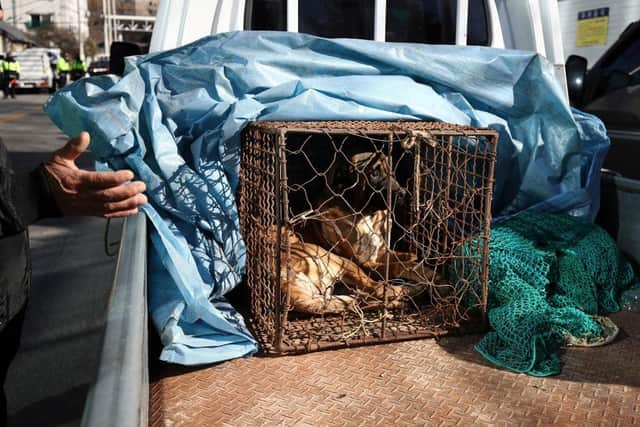South Korea has banned the butchering of dogs for meat - which countries still allow dogs to be eaten?
South Korea has banned the butchering and trade of dog meat – in a bid to stamp out the practice.
Here, we look at why its government has taken this step and which other countries still allow citizens to kill dogs for food.
Advertisement
Hide AdAdvertisement
Hide AdWhy has South Korea banned the dog meat trade?


Dog meat is a traditional food in South Korea dating back hundreds of years and some older people still enjoy “boshintang” – a dog meat stew. However, as the number of people keeping dogs as family pets has increased, the younger generation has turned its back on the practice.
A poll taken last year by Gallup found just 8 per cent of people in South Korea said they had eaten dog meat in the past year, down from 27 per cent in 2015. Fewer than a fifth of those questioned said they supported the consumption of the meat.
However, the main drive comes from South Korean president Yoon Suk Yeol and his wife Kim Keon Hee, who own six dogs and have called for a ban on dog meat. Ms Kim in particular is said to be opposed to eating dogs and has, along with animal rights groups, called for the practice to end.
MPs voted in favour of the legislation in Parliament on Tuesday.
Jung Ah Chae, executive director of the Humane Society in Korea, welcomed the new law. "While my heart breaks for all the millions of dogs for whom this change has come too late, I am overjoyed that South Korea can now close this miserable chapter in our history and embrace a dog friendly future," she said.
Is eating dogs now illegal in South Korea?
Strangely, no. The new law bans the killing of dogs for consumption – and trading in dog meat. However, eating dog meat is not technically illegal.
From 2027, when the ban comes into force, anyone found guilty of butchering dogs could face up to three years in prison, while people found guilty of raising dogs for meat or selling dog meat could serve a maximum of two years.
How many businesses in South Korea will be affected?
Some restaurants in the country still sell dog meat and some older customers say they are disappointed they will no longer be able to order their favourite dish.
Advertisement
Hide AdAdvertisement
Hide AdLast year, an audit of South Korea’s dog meat-related businesses found there were around 1,600 dog meat restaurants and 1,150 dog farms. Businesses affected by the move will be supported and given compensation, the South Korean government has said, although details of this have not yet been finalised.
Which other countries still allow the dog meat trade?
According to the Humane Society International, the dog meat trade is most widespread in China, South Korea, the Philippines, Thailand, Laos, Vietnam, Cambodia, Indonesia and Nagaland in northern India.
Dogs are also known to be eaten in certain African countries such as Ghana, Cameroon, DRC and Nigeria – and there are reports that dogs are killed for personal consumption by some farmers in remote parts of Switzerland. However, the vast majority of the industry is in Asia.
The charity says an estimated 30 million dogs are killed for human consumption each year.
Comments
Want to join the conversation? Please or to comment on this article.
